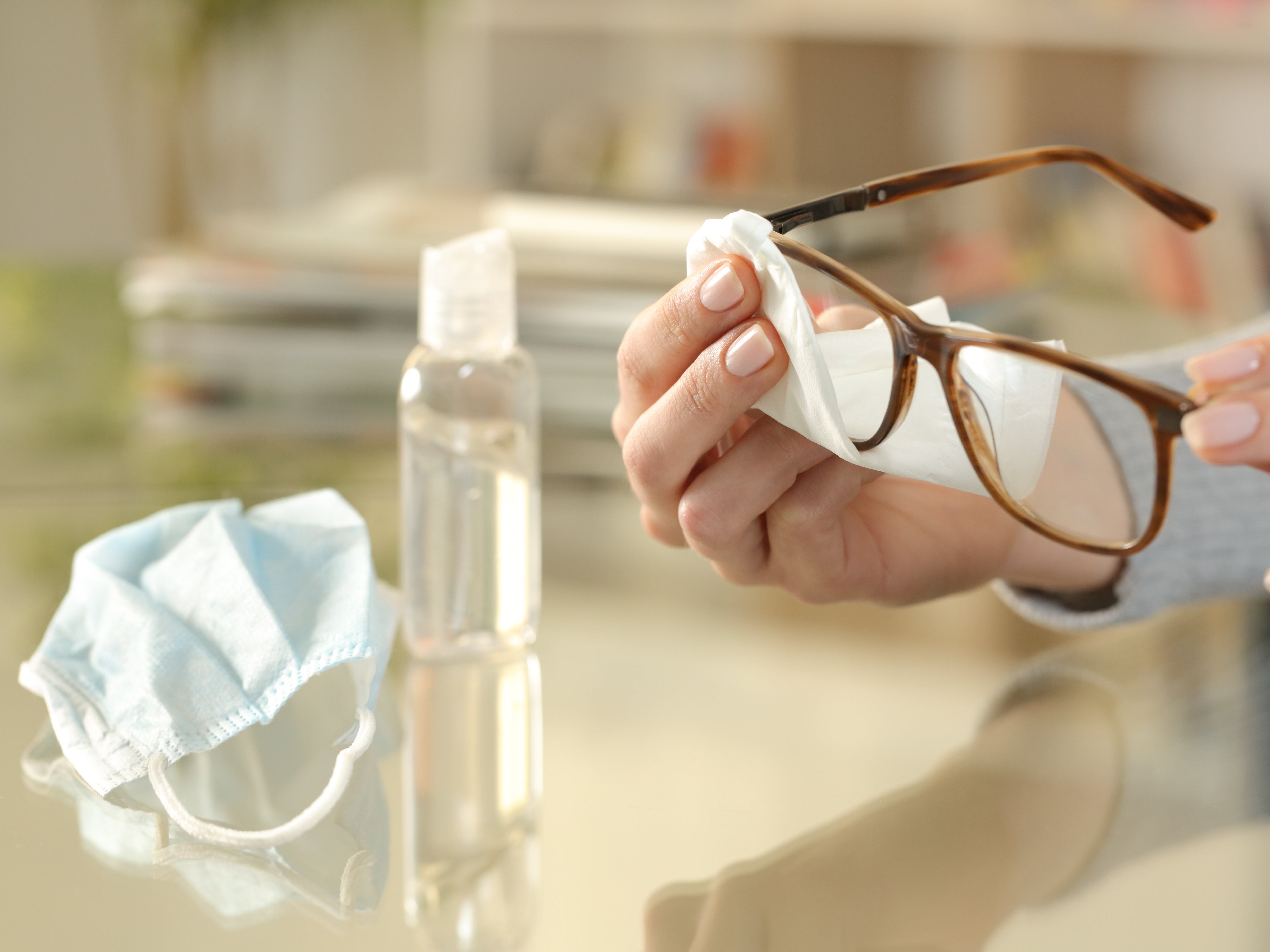The Independent's journalism is supported by our readers. When you purchase through links on our site, we may earn commission.
Do glasses protect from coronavirus?
Some research suggests eyeglasses may provide barrier from droplets

As researchers continue to learn more information about coronavirus, one possible theory linking eyeglasses and infection rates has emerged.
While analysing hospital data in China, researchers of a recent study noticed that the majority of patients hospitalised with coronavirus did not wear glasses, leading them to wonder whether glasses offer protection from the virus.
This is what you need to know about the link between eyeglasses and coronavirus.
Can you get coronavirus through your eyes?
According to the Centers for Disease Control and Prevention (CDC), Covid-19 spreads through respiratory droplets produced when an infected person coughs, sneezes, or talks.
The health agency notes that the most common transmission is when these droplets land in the mouth or nose of another person, who can then become infected.
However, the CDC also states that it is possible the virus spreads in other ways, such as when a person “touches a surface or object that has the virus on it and then touches their own mouth, nose, or possibly their eyes.”
“This is not thought to be the main way the virus spreads, but we are still learning more about how this virus spreads,” the agency states.
Do eye doctors recommend wearing eyeglasses as a way of protecting from coronavirus?
Since the pandemic began, some doctors have encouraged those who wear corrective eyewear to wear eyeglasses instead of contacts, for two reasons.
The first reason is because glasses can mean less chance of germs spreading to your eyes through contact with your hands.
Dr Sonal Tuli with the American Academy of Ophthalmology suggests that substituting glasses for lenses can "decrease irritation and force you to pause before touching your eye" and potentially prevent contaminated fingers from entering the eye.
The other reason is that glasses may act as a barrier from droplets, the same way that goggles do.
“Eye protection is often under-considered and not uniformly included in policies,” Dr Derek Chu previously told ABC News. “Goggles, face shields or even large eye glasses may be important in preventing droplet spread through the eyes as well as self inoculation via the hands.”
Lucy Wilson, a professor in the department of emergency health services at the University of Maryland Baltimore County, also acknowledged that glasses may provide a barrier from airborne droplets.
“Glasses can provide barrier protection against splashes or droplets, so in theory they could protect from SARS-CoV-2 exposure,” she told HuffPost. “Mucous membranes, including in the eye area, are a common way the coronavirus can enter the body.”
Do glasses actually protect from coronavirus?
While some data suggests that glasses can act like goggles and protect wearers from coronavirus, experts note that it is still too early to say for sure.
According to Dr Lisa Maragakis, an infectious disease specialist and associate professor of medicine at Johns Hopkins School of Medicine, who provided commentary alongside the recent study published in JAMA Ophthalmology, the findings are not conclusive for a number of reasons.
One reason is that the recent study was small, involving less than 300 cases, according to The New York Times.
Another reason is that the results may be impacted by other factors, such as “wearing glasses is simply associated with another variable that affects risk for Covid-19”.
“For example, it could be that people who wear glasses tend to be older, and more careful and more likely to stay home during a viral outbreak, than those who do not wear glasses,” The New York Times states. “Or perhaps people who can afford glasses are less likely to contract the virus for other reasons, like having the means to live in less crowded spaces.”
While Dr Maragakis acknowledges that the study does have “some biological plausibility, given that in health care facilities, we use eye protection,” she said it remains to be investigated “whether eye protection in a public setting would add any protection over and above masks and physical distancing.
“I think it’s still unclear,” she said.
Do the CDC consider glasses eye protection?
On its website, the CDC lists the recommended eye precautions that workers should take when they are at risk of acquiring infectious diseases via ocular exposure.
According to the CDC, eye protection such as goggles or a face shield provide a barrier to infectious materials entering the eye and are often used in conjunction with other PPE.
However, the agency notes: “Workers should understand that regular prescription eyeglasses and contact lenses are not considered eye protection.”
Overall, eyeglasses may offer wearers some protections from coronavirus due to the decreased likelihood of touching your eyes, as well as the possibility that the glasses can act as a barrier from respiratory droplets, but more research is needed.
Join our commenting forum
Join thought-provoking conversations, follow other Independent readers and see their replies
Comments

Bookmark popover
Removed from bookmarks